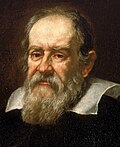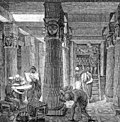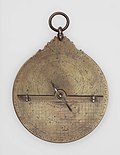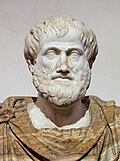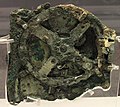— John Philoponus' refutation of the Aristotelian claim that the elapsed time for a falling body is inversely proportional to its weight Philoponus is...
26 KB (3,235 words) - 02:01, 24 October 2024
weights fall at the same speed are documented in sixth-century works by John Philoponus, which Galileo was aware of. In the 14th century, Nicole Oresme had...
129 KB (15,815 words) - 16:21, 21 November 2024
Momentum (section John Philoponus)
components, p = ħk, describes a de Broglie matter wave. In about 530 AD, John Philoponus developed a concept of momentum in On Physics, a commentary to Aristotle's...
73 KB (9,800 words) - 06:51, 24 November 2024
specific gravity. In the 6th century AD, Byzantine Alexandrian scholar John Philoponus modified the Aristotelian concept of gravity with the theory of impetus...
88 KB (10,802 words) - 14:05, 19 November 2024
Eternity of the world (section Philoponus' arguments)
became one of Philoponus’ major preoccupations and dominated several of his publications (some now lost) over the following decade. Philoponus originated...
15 KB (2,124 words) - 21:21, 13 October 2024
numerous Neoplatonists, including Damascius, Olympiodorus of Thebes, John Philoponus, Simplicius of Cilicia, and Asclepius of Tralles. Also among his pupils...
11 KB (1,172 words) - 21:32, 6 October 2024
to explain projectile motion against gravity. It was introduced by John Philoponus in the 6th century, and elaborated by Nur ad-Din al-Bitruji at the...
31 KB (4,455 words) - 00:47, 2 November 2024
6th-century Byzantine Greek philosopher and Aristotelian commentator John Philoponus argued that the Aristotelian assertion that objects fall proportionately...
14 KB (1,638 words) - 01:32, 17 November 2024
education in Late antiquity, with philosophers such as Iamblichus and John Philoponus writing commentaries on it. A Latin paraphrase by Boethius of Nicomachus's...
17 KB (1,751 words) - 00:20, 29 October 2024
500 years after the Arab conquest of Alexandria. John the Grammarian appears to be John Philoponus, who must have been dead by the time of the conquest...
85 KB (10,126 words) - 21:49, 20 November 2024
Philoponus appeared; unlike Aristotle, who based his physics on verbal argument, Philoponus relied on observation. On Aristotle's physics Philoponus wrote:...
87 KB (9,683 words) - 14:57, 22 November 2024
134–154. JSTOR 44172367. Sorabji, Richard (2010). "John Philoponus". In Sorabji, Richard (ed.). Philoponus And The Rejection Of Aristotelian Science: Second...
8 KB (1,089 words) - 12:49, 12 September 2024
Philoponus, and brought proofs that he agreed with Severus and Theodosius. They were banished to Palestine, and Philoponus wrote a book against John Scholasticus...
13 KB (1,667 words) - 22:16, 11 July 2024
but cannot penetrate a large piece. Sorabji, Richard (2010). "John Philoponus". Philoponus and the Rejection of Aristotelian Science (2nd ed.). Institute...
122 KB (15,388 words) - 23:52, 11 November 2024
Press. pp. 65–66. ISBN 9781400858989. Sorabji, Richard (2010). "John Philoponus". Philoponus and the Rejection of Aristotelian Science (2nd ed.). Institute...
16 KB (1,951 words) - 22:19, 8 November 2024
Middle Ages in the Middle East. About 550 AD, Christian philosopher John Philoponus wrote a treatise on the astrolabe in Greek, which is the earliest extant...
32 KB (4,235 words) - 23:38, 6 October 2024
Press. ISBN 0226316351. Modern editions of John Philoponus' treatise on the astrolabe are Philoponus, John (1839) [c. 550]. Hase, Heinrich (ed.). De usu...
50 KB (5,395 words) - 18:49, 21 November 2024
the Byzantine Empire and Abbasid Caliphate. In the Byzantine Empire, John Philoponus, an Alexandrian Aristotelian commentator and Christian theologian,...
52 KB (6,123 words) - 05:59, 8 October 2024
the matter was motion, not stasis (stagnation). In the 6th century, John Philoponus criticized the inconsistency between Aristotle's discussion of projectiles...
27 KB (2,952 words) - 03:19, 8 November 2024
Archimedes' mathematical contributions were collected and studied. John Philoponus, another Byzantine scholar, was the first to question Aristotle's teaching...
207 KB (23,274 words) - 03:25, 21 November 2024
Jean Buridan (redirect from John Buridan)
found in the commentary of John Philoponus on Aristoteilan physics. In this he was possibly influenced by John Philoponus who was developing the Stoic...
18 KB (1,986 words) - 07:42, 4 November 2024
Aristotle were Philoponus, Elias, and David in the sixth century, and Stephen of Alexandria in the early seventh century. John Philoponus stands out for...
164 KB (17,901 words) - 09:10, 24 November 2024
philosopher John Philoponus was the first to question Aristotelian physics. Unlike Aristotle, who based his physics on verbal arguments, Philoponus relied...
238 KB (25,997 words) - 11:12, 20 November 2024
first formulated by a Greek-speaking Syriac Christian neo-Platonist, John Philoponus, who claims to find a contradiction between the Greek pagan insistence...
49 KB (5,921 words) - 07:20, 11 November 2024
Nontrinitarianism (section John 1:1)
Arians", Select Treatises, Newman, John Henry Cardinal trans, Longmans, Green, & Co, p. 124, footn. John Philoponus – Tritheism – Stanford Encyclopedia...
104 KB (12,485 words) - 19:56, 10 November 2024
insights and speculation. The works of the early Byzantine scholar John Philoponus inspired Western scholars such as Jean Buridan to question the received...
32 KB (3,872 words) - 21:52, 16 November 2024
Constantinople. May 3 – Kʼan Joy Chitam I, ruler of Palenque (d. 565) John Philoponus, Aristotelian commentator and philosopher (d. 570) Romanos the Melodist...
3 KB (270 words) - 11:37, 29 October 2024
Johannes (2018). "Personhood in Miaphysitism: Severus of Antioch and John Philoponus". Personhood in the Byzantine Christian Tradition: Early, Medieval...
27 KB (3,214 words) - 09:40, 2 November 2024
astronomy of Ptolemy lived in this era, such as Eutocius of Ascalon and John Philoponus. Several Greco-Roman astrological treatises are also known to have...
34 KB (4,192 words) - 16:59, 22 November 2024
480–524). John Philoponus (c. 490–570). Pseudo-Dionysius the Areopagite (c. 500). Isidore of Seville (c. 560–636). Christian philosopher. John of Damascus...
29 KB (3,044 words) - 01:59, 15 November 2024



